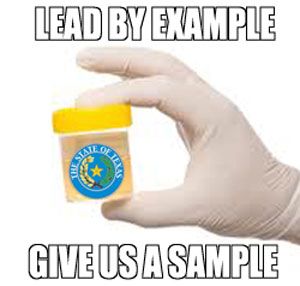Another solution in search of a problem from the Republican leadership.
Out of the more than 250 bills filed Monday, the first possible day to file legislation for the 83rd session, one measure — concerning drug testing for welfare applicants — is already drawing the support of the state’s top lawmakers and the criticism of civil liberties advocates.
Senate Bill 11 would require applicants to the Texas Temporary Assistance for Needy Families program to undergo a drug test. If applicants fail the test, they would not be eligible to apply again for a full year, unless they attended a substance abuse treatment program. The bill was written by state Sen. Jane Nelson, R-Flower Mound, and several other Republican lawmakers.
“This will help prevent tax dollars from going into the pockets of drug abusers,” Gov. Rick Perry said Tuesday at a news conference. He said that the goal of the bill is to “empower every Texan to reach their potential,” because “being on drugs makes it harder to begin the journey to independence.”
“It is a legitimate function of government to help people that are not able to help themselves,” added Lt. Gov. David Dewhurst. He said that because “virtually every” business he has encountered uses random drug testing on employees, it’s a good idea for the state and will lead to reduced unemployment by proving to employers that the people they are hiring have been certified by the state as drug-free.
“We owe it to all Texans to structure our welfare and unemployment programs in a way that guarantees that recipients are serious about getting back to work,” he said.
“This is not all about punishment,” Perry added. “This is also an incentive to get people off of these drugs.”
But critics of the bill say the bill is needlessly punitive and will mainly harm innocent children, whose parents are found to have even a minor amount of drugs. “The purpose of TANF was really to help children,” said Terri Burke, executive director of the American Civil Liberties Union in Texas. “If you don’t give the moms the money, then the children lose out.”
She pointed specifically to the bill’s provision that would require the Texas Health and Human Services Commission to report applicants with drug abuse problems to Child Protective Services. “Now we’re going to take the child of a parent who has smoked a couple of joints and give them to CPS,” she said. “If there’s a genuine concern about drug abuse, let’s do something about it. There’s no evidence that poor people abuse drugs more than other folks, but we keep coming up with bills that target poor people.”
“Adding insult to injury,” Jim Harrington, director of the Texas Civil Rights Project, said in a press release, “is that Perry would pay for the drug testing out of the very TANF funds that should go to provide assistance to people. In other words, he’s taking about $350,000 worth food and assistance from all families from the general TANF grant just to try to find a few violators. This is simply callous and perverse.”
I don’t have much to say that hasn’t already been said by Lisa Falkenberg, Burka, Jason Stanford, BOR, Stace, or EoW. I’m particularly fond of Rep. Joe Deshotel’s response, noted in that BOR post, which was a call to add a drug test requirement to the application to run for state office in Texas. Lord knows, for the amount we spend on Rick Perry’s travel detail, we ought to get some assurance he’s not taking the opportunity to toke up while out on the road.
All other concerns aside, the bottom line is that this has been done in other states, most notably Florida, and there were no savings to be had and very few users getting caught. Burka astutely noted the parallel to the failed program of steroid testing for high school athletes, another expensive way for the state to (if you’ll pardon the expression) piss its money away chasing something that wasn’t there in the first place. For a gang that likes to rhapsodize about getting government out of people’s lives, they sure sing a different tune when it comes to the lives of people they don’t like.


I wonder how something like this is going to work as there become more places in the US that have medical or recreational marijuana legalization? Can Texas deny insurance benefits the applicant has paid premiums on for actions they took that were legal in that jurisdiction?
Probably, but eventually, someone will face that problem and it will end up in court.